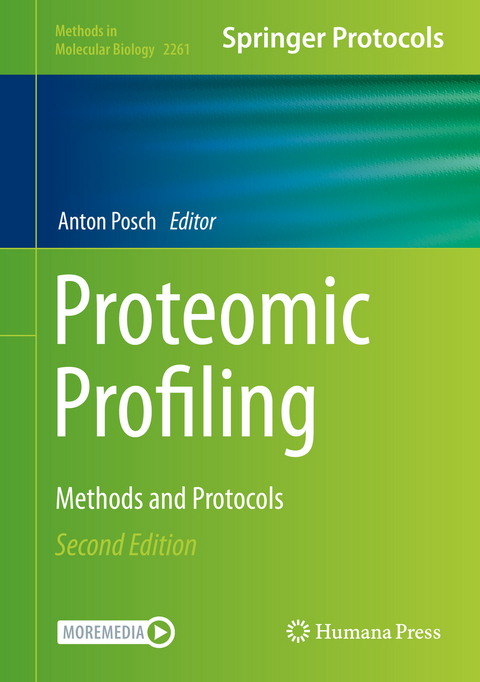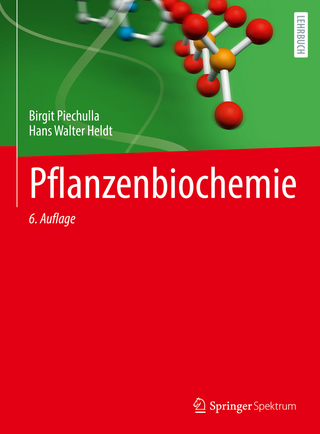
Proteomic Profiling
Springer-Verlag New York Inc.
978-1-0716-1185-2 (ISBN)
Authoritative and up-to-date, Proteomic Profiling: Methods and Protocols, Second Edition serves as an ideal reference for students of biochemistry, biomedicine, biology, and genomics and will be an invaluable source for the experienced, practicing scientist as well.
How Modern Mass Spectrometry Can Solve Ancient Questions: A multi-Omics Study of the Stomach Content of the Oldest Human Ice Mummy, the 5300-Year-Old Iceman or Oetzi.- Step-by-Step Sample Preparation of Proteins for Mass Spectrometric Analysis.- Lab-on-a-Filter Techniques for Economical, Effective, and Flexible Proteome Analysis.- Released N-Glycan Analysis for Biotherapeutic Development Using Liquid Chromatography and Mass Spectrometry.- Comprehensive Protocol to Simultaneously Study Protein Phosphorylation, Acetylation, and N-Linked Sialylated Glycosylation.- Phos-Tag Fluorescent Gel Staining for the Quantitative Detection of His- and Asp-Phosphorylated Proteins.- Polyubiquitin Profile in Down Syndrome and Alzheimer Disease Brain.- Platform Methods to Characterize the Charge Heterogeneity of Three Common Protein Therapeutics by Imaged Capillary Isoelectric Focusing.- A Protocol for Isolation, Purification, Characterization, and Functional Dissection of Exosomes.- Human Plasma Extracellular Vesicle Isolation and Proteomic Characterization for the Optimization of Liquid Biopsy in Multiple Myeloma.- Isolation of Extracellular Vesicles for Proteomic Profiling.- Isolation of Proteins from Extracellular Vesicles (EVs) for Mass Spectrometry-Based Proteomic Analyses.- Flow Cytometry as an Important Tool in Proteomic Profiling.- Improved Immunoprecipitation to Mass Spectrometry Method for Enrichment of Low-Abundant Protein Targets.- Multiplex Fluorescent Bead-Based Immunoassay for the Detection of Cytokines, Chemokines, and Growth Factors.- Bead-Based Multiplex Immunoassays: Procedures, Tips, and Tricks.- Immunoaffinity-Based Liquid Chromatography Mass Spectrometric Assay to Accurately Quantify the Protein Concentration of HMGB1 in EDTA Plasma.- Recombinant Anti-Idiotypic Antibodies in Ligand Binding Assays for Antibody Drug Development.- cDNA Display-Mediated Immuno-PCR (cD-IPCR): An Ultrasensitive Immunoassay for Biomolecular Detection.- Chromatin Immunoprecipitation (ChIP) to Study DNA-Protein Interactions.- Profiling Protein-DNA Interactions by Chromatin Immunoprecipitation in Arabidopsis.- Biotin Proximity Labeling for Protein-Protein Interaction Discovery: The BioID Method.- Studying OTUD6B-OTUB1 Protein-Protein Interaction by Low-Throughput GFP-Trap Assays and High-Throughput AlphaScreen Assays.- Thermal Shift Assay for Exploring Interactions between Fatty Acid-Binding Protein and Inhibitors.- Isolation and Purification of Mitochondria from Cell Culture for Proteomic Analyses.- Investigating the Adipose Tissue Secretome: A Protocol to Generate High Quality Samples Appropriate for Comprehensive Proteomic Profiling.- Methods for Proteomics-Based Analysis of the Human Muscle Secretome Using an In Vitro Exercise Model.- Western Blotting Using In-Gel Protein Labeling as a Normalization Control: Advantages of Stain-Free Technology.- Technical Considerations for Contemporary Western Blot Techniques.- Simple Western: Bringing the Western Blot into the 21st Century.- Development of Peptide Ligands for Targeted Capture of Host Cell Proteins from Cell Culture Production Harvests.- Sample Preparation of Secreted Mammalian Host Cell Proteins and their Characterization by Two-Dimensional Electrophoresis and Western Blotting.- Quantitative Proteomic Analysis Using Formalin-Fixed Paraffin-Embedded (FFPE) Human Cardiac Tissue.- Chloroplast Isolation and Enrichment of Low Abundant Proteins by Affinity Chromatography for Identification in Complex Proteomes.- Principles of Protein Labeling Techniques.- Mechanical/Physical Methods of Cell Disruption and Tissue Homogenization.
| Erscheinungsdatum | 15.01.2021 |
|---|---|
| Reihe/Serie | Methods in Molecular Biology ; 2261 |
| Zusatzinfo | 91 Illustrations, color; 40 Illustrations, black and white; XV, 592 p. 131 illus., 91 illus. in color. With online files/update. |
| Verlagsort | New York, NY |
| Sprache | englisch |
| Maße | 178 x 254 mm |
| Themenwelt | Naturwissenschaften ► Biologie ► Biochemie |
| Naturwissenschaften ► Biologie ► Mikrobiologie / Immunologie | |
| Naturwissenschaften ► Biologie ► Zellbiologie | |
| ISBN-10 | 1-0716-1185-2 / 1071611852 |
| ISBN-13 | 978-1-0716-1185-2 / 9781071611852 |
| Zustand | Neuware |
| Haben Sie eine Frage zum Produkt? |
aus dem Bereich


